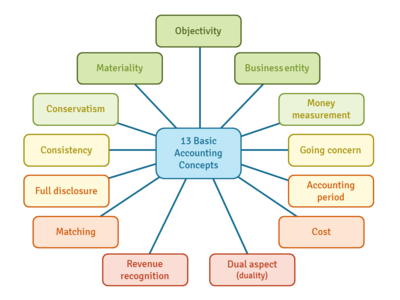Objectivity concept
| Objectivity concept |
|---|
| See also |
Objectivity concept is one of 12 basic accounting concepts (among: money measurement, going concern, accounting period, cost, duality, revenue recognition, matching, full disclosure, consistency, prudence and materiality)[1]. According to the objectivity concept, an accounting transaction should be free from accountants bias. All records should be reported on financial statements with having objective evidence in the background. It means all transactions should be covered with documents and vouchers that could be verified. If the rule is not kept, the users of financial statements cannot be sure about its confidence and quality[2].
The objectivity concept also relates to sociology and philosophy. Worldwide it is negotiated concept, understood locally in many ways. It has many layers of interpretations, depending on perception and might result in misunderstandings depending on the culture. It mainly differentiate in perceptions of truth. In journalism, objectivity means that all parties have opportunities to be heard and all point of views are presented[3].
In science disciplines, objectivity is achieved by using defined and comparable measurements, patterns and experimentally confirmed hypotheses that become theories.
Examples for transactions fulfilling objectivity concept (accounting)
Below are presented two purchase transactions that fulfilled the objectivity concept[4]:
- purchase transaction of materials is supported with cash receipt with value of money paid,
- purchase transaction of machine is supported with invoice and delivery document,
- bank statement proving the amount of cash in the bank,
- supplies on hand counted physically and confirmed with documentation,
Reasons of keeping objectivity concept (accounting)
Objectivity concept is important in accounting from the following reasons[5]:
- creates basis for tracking historical cost,
- creates documentary evidences of transactions,
- records actually paid cost,
- records an asset,
- enables verification with documents and of documents,
- records a market value at the moment, cause it might be different from person to person or from place to place,
- determines the market value of an asset, as from accounting perspective it is difficult to access value of an object before it is sold,
- simplify comparisons in case of any judgements or estimates,
- helps to identify other subjective factors in preparing financial statements
- helps to estimate future costs at better accuracy,
- users are sure they can rely on financial statements,
- financial statements are prepared in neutral manner.
Footnotes
References
- Asogwa C. I., (2014), Representing objectivity in "Journal of Research in Humanities and Social Science Volume 2 ~ Issue 9", Quest Journals
- Deepak S., (2016), Financial Accounting (For NEHU), Vikas Publishing House
- Frey E., (2007), Objectivity – An Ideal or a Misunderstanding?, in "Negotiating Journalism Core Values and Cultural Diversities", Nordicom
- NCERT, (2015), Theory Base of Accounting, NCERT
- Warren C., (2008), Survey of Accounting, Cengage Learning
Author: Katarzyna Żurek
